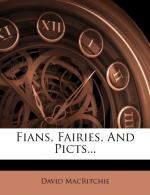Various other considerations have also to be borne in mind; not the least important of which is the fact that the very people who have preserved these traditional beliefs have done much to obscure them, owing to their want of education. Scott tells a story of a Scotch peasant who, discovering a company of gaily-dressed puppets standing in a thicket, where they had been concealed by a travelling showman, at once concluded that they were “fairies.” He had inherited the belief that fairies were “little people” who frequented just such places as this; consequently, he decided these were fairies. This fact was elicited in court, where the countryman had to appear as a witness. From that time onward his mind ought to have been disabused of his hasty belief. But a man so stupid as to assume that a showman’s marionettes were anything else than lifeless dolls, might continue for the rest of his life to recount his marvellous meeting with “the fairies.” Similarly, to a tipsy man returning homeward from market, many common and every-day objects take on a weird and superhuman aspect, due to no other spirits than those he has consumed. From this cause, a large number of odd stories (such as one told by Mr. William Black of a tipsy Hebridean) has doubtless arisen. Further, the belief in the existence of “supernatural” beings has been much utilised by rustic humourists, and no doubt also by smugglers and other night-birds, in comparatively recent times. The prolonged absence of a husband, or it may be of a wife, could be explained by some wild legend of having been “stolen by the fairies,” when a more frank avowal dared not be offered. And although “strange tales were told” regarding the paternity of “Brian,” in The Lady of the Lake, and although Scott adheres to those legends in his poem, he does not fail to point out in his appended Note that the story could be explained in a much more rational manner. There have been many “Brians.”
To give this subject the special attention which it deserves would, however, swell these introductory notes to an intolerable size; and, indeed, their purpose is rather to show what the euhemeristic theory is than what it is not; that is to say, the euhemeristic theory as applied to the traditions relating to dwarf races.
In the work to which I have referred, the opinions enunciated by Professor Nilsson and Mr. J.F. Campbell, together with other developments which suggested themselves to me, were duly set forth, and were received, as was to be expected, with every form of comment, from complete approval to entire dissent. Among the adverse criticisms, some arose from a misapprehension of the case, while others were due to the critic’s imperfect acquaintance with the subject he professed to discuss. But besides these, there were of course the legitimate objections which can always be urged in matters of a debateable character, where there is no positive evidence on either side.




